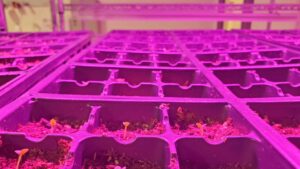People News
Makhteshim Agan of North America (MANA) Canada has hired Steve Lepper as area business manager. Lepper will cover the sales territory encompassing southwest Manitoba and southeast Saskatchewan. With more than 18 years of experience in the crop protection business, he is well suited to help MANA Canada further grow its market portfolio. Lepper has worked on the retail side of the seed business and as branch manager of a large farm retailer in southern Manitoba.
Biotechnology industry veteran Donald Marvin has joined Inocucor Technologies Inc., an ag biotech company in Montreal, as president and CEO. Previously, Marvin was president and CEO of Cairn Associates Inc., a biotechnology, life science and consumer products strategy development and financial advisory firm. Inocucor has also signed its first commercial strategic partnership with Quebec-based Axter Agroscience Inc. Inocucor’s partnership with Axter follows two growing seasons of collaboration between the two companies that began in 2013. The companies intend to finalize field studies on the combined action of IN-M2, Inocucor’s second-generation cell-free growth stimulant, and Axter’s biostimulants to complete farmer trials and begin initial sales in spring 2015.
Steve Douglas has been named Agrium Inc. senior vice-president and CFO, effective Nov. 3. Formerly with Brookfield Asset Management, Douglas was senior managing partner and CFO of Brookfield Property Partners. As Agrium CFO, Douglas is responsible for all strategic elements of the financial operations and will be a member of the senior leadership team.
The Canola Council of Canada (CCC) has appointed Brian Innes as the CCC’s new vice-president of government relations. Effective Nov. 1, Innes will lead the full spectrum of the CCC’s government relations activities, including market access and regulatory affairs. Innes joined the CCC in 2011.
Product News
Clean Seed Capital Group delivers the next generation in precision agriculture with its CX-6 Smart Seeder, which customizes seed and fertilizer rates within each row in a field.
“The CX-6 can meter up to six different products right above each row opener,” says Colin Rosengren, Clean Seed vice-president of agronomic practices and protocols. “We’ve changed the approach to seeding altogether into the next generation of machine, moving metering back to each indiv-idual opener at a plant-level resolution.” Electric motors above each opener control the amount of seed, fertilizer or other products that are applied to the soil.
Valent Canada Inc. announced that Nufarm Agriculture Inc. has been appointed as the exclusive distributor of NipsIt seed treatments for on-farm use in Canadian markets. NipsIt Inside is an insecticide seed treatment that provides wheat growers protection from insects such as wireworms through contact and super-systemic activity. NipsIt Inside stays in the seed/root zone longer than other insecticide seed treatments due to its lower water solubility. NipsIt Suite contains the fungicidal active ingredients metconazole and metalaxyl, and insecticidal active ingredient clothianidin.
Canadian canola growers now have the option to grow Nexera canola with or without a production contract in 2015. With the new 2015 Flexibility Agreement, farmers can grow Nexera and market it as a commodity canola with the added potential of obtaining a delivery contract for the Omega-9 oil premium in response to end-use demand. To sign a Nexera Flexibility Agreement, growers can contact their local Dow AgroSciences representative, an authorized Nexera canola independent retailer, or an authorized Nexera canola Co-op retailer.
Business News
DuPont Pioneer began construction on a new multi-million dollar research facility in Lethbridge, Alta. The facility will focus on developing ultra-early maturity corn products for growers in Alberta and Western Canada. “This facility supports our commitment to providing growers in Western Canada with more choice through the development of ultra-early corn products that might increase the profitability of their operations,” says Steve King, corn research director for DuPont Pioneer. Construction is underway on the 22,500 square-foot research facility and the building is expected to open this fall. Research plots were planted at the site this past spring.
Loveland Products Inc., a subsidiary of Agrium, and Actagro LLC have entered into a commercialization and technology development agreement for soil and plant health nutritional products. Based on the Actagro Organic Acids Technology Platform, the agreement gives Loveland Products expanded distribution, commercialization and development rights to the platform in the Eastern United States, Canada and Australia. Under the agreement, Loveland Products will broaden its access to the Actagro platform to complement its portfolio of plant health and nutrition products. Loveland Products and Actagro will also integrate Actagro’s organic acids technology platform into existing and future product offerings.
Industry News
The Canadian government is providing $182,558 for La Coop fédérée as part of Agriculture Canada’s AgriInnovation program for a project on introgression of desirable food quality traits in soybeans. The investment will enable La Coop fédérée to enhance soybean breeding and seed quality, providing Canadian farmers and food processors with new varieties better suited to their needs. The results will help soybean growers better compete in domestic and international markets and increase profitability through higher yields.
Researchers at the University of Saskatchewan are part of an international team that published the first chromosome-based draft sequence of the wheat genome — a development that promises wheat breeders powerful new tools for developing varieties that meet the challenges of global population growth and climate change. “The release of the chromosomal draft of the wheat genome sequence will accelerate gene discovery in wheat and pave the way for development of tools to improve breeding of complex traits, such as yield, insect and disease resistance, and end-use quality,” says Curtis Pozniak, one of the principal investigators for the University of Saskatchewan’s contribution to the paper, which has been published in the journal Science.
Saskatchewan-based Agriculture and Agri-Food Canada researcher Isobel Parkin is part of an international team that has deciphered the complex genome of Brassica napus, extensively cultivated as canola in Canada. Boulos Chalhoub of the National Institute for Agricultural Research in France led a team of scientists from 30 research institutes from all regions where the crop is produced, including National Research Council Canada. The results are published in the journal Science.
The Canadian government invests $7 million to Bioindustrial Innovation Canada for a first-of-its-kind national bioproducts cluster. The aim of the cluster is to bridge the gap between research and market-ready products by connecting technology development projects across Canada. The expected results will create opportunities for Canadian farmers and provide a more competitive future for Canadian agriculture by putting farm waste to profitable use. Agriculture and Agri-Food Canada scientists will explore the use of food by-products for the manufacture of gums and landscape products, and develop new varieties of wheat, rye and triticale that can be used to produce high-value biochemicals and bioenergy.
According to a recent study published in the journal PLOS ONE, climate change might expand suitable cropland, particularly in the Northern high latitudes of Canada, Russia and China during the next 100 years. However, tropical regions might become decreasingly suitable. The study found that in the absence of adaptation measures, such as increased irrigation, the simulation projects a significant loss of suitable agricultural land in Mediterranean regions and in parts of sub-Saharan Africa. Conducted by Florian Zabel and colleagues from Ludwig Maximilians University in Germany, the study states that, most of the Earth’s accessible agricultural land is already under cultivation. Ecological factors such as climate, soil quality, water supply and topography determine the suitability of land for agriculture. Climate change might impact global agriculture, but some regions could benefit from it.
The federal government is providing $400,000 toward research to find new feed wheat varieties. The four-year project will focus on developing new feed wheat varieties that are high yielding, flood tolerant, fusarium resistant and tolerate high salinity soils. Researchers will use traditional plant breeding techniques, so any resulting varieties will not be considered genetically modified and could be used in all livestock operations. The research will be led by the Western Feed Grain Development Co-op, which will also contribute $1.8 million toward this program. “The Western Feed Grain Development Co-op is looking forward to applying these funds to our breeding program and addressing major areas of concern for Prairie producers, including post-seeding excess moisture, salinity and aster yellows,” says David Rourke, Western Feed Grain Development Co-op director.
During the next four years, the Canadian Wheat Alliance, along with plant breeding companies KWS and Syngenta Inc., will partner to develop high-quality wheat plants by improving doubled haploid technologies. These methods expose immature grains to treatments that double the genetic material and reduce the length of crop improvement cycles. The partners will increase efficiency to produce fertile doubled haploid wheat plants compared to more traditional methods. The partners will also leverage the new doubled haploid technology platform in their respective wheat breeding programs.
A study was conducted by Research and Markets titled Canada seed treatment market — growth, trends and forecasts by application area and crop type (corn/maize, soybeans, wheat, rice, canola, cotton and other crops 2014-2020). According to the authors, the Canadian market for seed treatments is projected to reach US$81.2 million by 2020 at a compound annual growth rate of 5.8 per cent from 2014 to 2020. While chemical agents constitute the largest application segment, estimated to account for 94.5 per cent in 2014, demand for biological agents is likely to record the fastest compound annual growth rate at seven per cent. By crop type, demand for seed treatment is the largest in corn/maize, which is estimated 32.6 per cent of the market in 2014, and fastest growing in canola with a seven per cent compound annual growth rate for 2014-2020.













